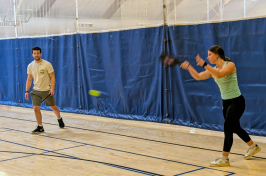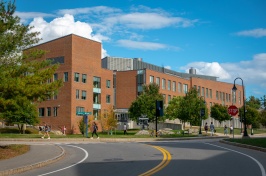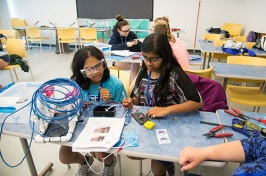The University of New Hampshire is a flagship research university that inspires innovation and transforms lives in our state, nation and world. More than 16,000 students from all 50 states and 71 countries engage with an award-winning faculty in top ranked programs in business, engineering, law, health and human services, liberal arts and the sciences across more than 200 programs of study. UNH’s research portfolio includes partnerships with NASA, NOAA, NSF and NIH, receiving more than $100 million in competitive external funding every year to further explore and define the frontiers of land, sea and space.
UNH Researchers to Develop First Strawberry Varieties Specifically for U.S. Organic Production

DURHAM, N.H. – Scientists with the New Hampshire Agricultural Experiment Station at the University of New Hampshire have launched a research project that aims to develop the first varieties of strawberries specifically designed for organic agriculture in the United States.
The organic strawberry varieties will be developed for optimal production in New England using advanced genetic techniques. UNH is recognized as one of a very small handful of institutions worldwide working at the forefront of strawberry genomics and its application to strawberry breeding.
“No strawberry varieties yet have been developed specifically for organic agriculture in the United States, and only one company located in Europe offers any strawberry seed-propagated varieties specifically for organic production,” said experiment station researcher Lise Mahoney, who is leading the three-year project. “We want to provide strawberry growers with regionally adapted, seed-propagated strawberry varieties that are suitable for organic agriculture and are pleasing to consumers.”
The research project has received strong support from Driscoll’s Berries, Inc., a leading developer and producer of organic strawberries and other berries, and High Mowing Organic Seeds, a leading developer and producer of organic seeds.
“Organic berry production makes up well over 10 percent of our berry portfolio making Driscoll's one of the largest providers of organic berries in the U.S.,” said Richard Harrison, vice president of global variety development for Driscoll’s Berries, Inc. “Organic strawberries are one of the fastest growing segments within our business and we see strong potential for this market well into the future.”
Experiment station researchers plan to produce both day-neutral and short-day flowering strawberry varieties for organic agriculture that can be propagated by seed rather than by the conventional runner plant approach. According to Mahoney, strawberries typically are propagated vegetatively from runners and purchased by growers as bare-root plants. However, this bare-root production method presents major problems in regards to organic agriculture.
First, the process of generating the bare-root plants requires chemical inputs to avoid transmission of diseases. Second, the grower planting schedule is dictated by the bare-root supplier and therefore planting stock availability is seasonally limited according to the purchaser's climatic region.
“It is refreshing to witness research thinking outside the box with respect to strawberry varietal development and propagation method,” said Tom Stearns, founder and owner of High Mowing Organic Seeds. “Seed varieties in strawberry, particularly those selected in an organic environment, would provide a valuable and needed option to vegetatively propagated plants. Strawberry hybrid seed varieties and seeds that are bred in an organic environment would open an intriguing new market for us.”
Mahoney and her collaborators, including Tom Davis, professor of genetics, molecular and evolutionary systems biology, and sustainable agriculture and food systems, and Becky Sideman, professor of plant biology and extension professor and specialist in sustainable horticulture production, will use an advanced breeding method called marker-assisted breeding. Marker-assisted breeding allows scientists to conduct traditional cross-hybridization and trait-based selection using genetic testing. Mahoney and Davis will conduct the genetic testing using the IStraw90® SNP Array, which they helped develop.
The United States is the world’s leading producer of strawberries. In 2014, the United States produced more than 3 billion pounds valued at $2.9 billion, according to the USDA. Most U.S. strawberries are grown in California. Strawberries are an important crop in New Hampshire. Sideman estimates the retail value of New Hampshire’s strawberry crops at about $1.85 million.
This research project is funded by the National Institute of Food and Agriculture’s Organic Agriculture Research and Extension Initiative (OREI) under accession number 1013061. Collaborators also include Driscoll’s Berries, Inc., High Mowing Organic Seeds, and David Handley, vegetable and small fruit specialist at University of Maine Cooperative Extension, a recognized specialist and evaluator of strawberry varieties.
This material is based upon work supported by the NH Agricultural Experiment Station, through joint funding of the National Institute of Food and Agriculture, U.S. Department of Agriculture, and the state of New Hampshire. This research also has been supported by a broad USDA/NIFA-funded international research effort, RosBREED.
Founded in 1887, the NH Agricultural Experiment Station at the UNH College of Life Sciences and Agriculture is UNH’s original research center and an elemental component of New Hampshire's land-grant university heritage and mission.
PHOTOS AVAILABLE FOR DOWNLOAD
https://colsa.unh.edu/nhaes/sites/colsa.unh.edu.nhaes/files/media/unhorganicstrawseedlings.jpg
https://colsa.unh.edu/nhaes/sites/colsa.unh.edu.nhaes/files/media/unhorganicstrawrows.jpg
https://colsa.unh.edu/nhaes/sites/colsa.unh.edu.nhaes/files/media/unhorganicstrawfield.jpg
https://colsa.unh.edu/nhaes/sites/colsa.unh.edu.nhaes/files/media/unhorganicstrawharvest.jpg
UNH’s organic strawberry research will be conducted at the Macfarlane Research Greenhouses and Woodman Horticultural Research Farm, both facilities of the NH Agricultural Experiment Station. Preliminary research for this project was conducted at the two facilities earlier this year.
-
Media Contact
Lori Tyler Gula, PhD | NH Agricultural Experiment Station | lori.gula@unh.edu | 603-862-1452
Latest News
-
October 8, 2025
-
October 2, 2025
-
September 24, 2025
-
September 15, 2025
-
August 21, 2025














































